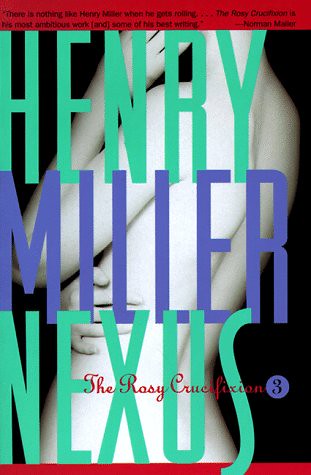
Nexus (The Rosy Crucifixon #3). Henry Miller. Grove Press (1987), Paperback, 316 pages.
"How does one know that one day he will take wing, that like the hummingbird he will quiver in mid-air and dazzle with iridescent sheen? One doesn't. One hopes and prays and bashes his head against the wall."
There is an element of the exotic and the animalistic in Miller, but at his core, he is a typical and rebellious American. He is equally at home comparing himself to a dog or to Jesus, and through these images, he traces his evolution from Wastrel to Want-Not Prophet, from his dingy childhood to idyllic Paris. On the surface, it is easy to see oneself in Miller's desperate attempts to sort out love, work, money, and art. ...and really, Miller is so likable in this last installment of The Rosy Crucifixion precisely because he is exactly like most other Americans: cursing our day jobs and fantasizing about the adventures we will have when we are fortunate enough to retire. I may be exaggerating a bit, but Miller manages--at least in part--to relish life and his role in it, regardless of both its glories and its flaws. He learns to let go, pick up, embrace everything, value nothing...this book almost reads like Miller's Enlightenment/Gnosis/Reincarnation/Resurrection...and that is the idea.
Nexus features less of the sex-capades of Sexus and the rambling characterizations of Plexus. Instead, Miller's writing falls into more of the agitated and artistic rambling that was only occasional during those downtrodden times. He refers to the sources of his inspiration more frequently, and somehow manages to both glorify and demonize them as he finds his own voice.
I took a lot of personal notes while I was reading Plexus, and I regret being less thorough as I read Nexus. There are so many references to other authors, painters, sculptors, musicians, and historical figures that taking notes would be a lengthy endeavor. As this was my first reading of Nexus, I'll leave that to future exploration, and I'll sum up the experience with one of Miller's last references:
***SPOILER ALERT!!!!***
***************************
At last, I'll say this: Nexus is the culmination of several years of struggling to act and to become what Miller already was: a writer. I would recommend the trilogy for anyone who has ever struggled with a difficult career move or lifestyle choice. Miller's experiences ring true, and his advice is pure: be yourself and learn when to say, "Goodbye!" (Now, don't all run out on your families just because Paris beckons. Follow your own paths.)
Rating: 4/5

![Aesop's Fables; A New Translation [Kindle Edition]](http://farm6.static.flickr.com/5172/5401777224_25184c257d.jpg)